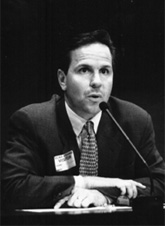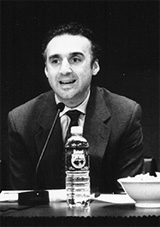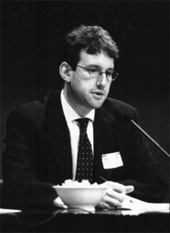2002 Spring Forum
Speakers at EMTA’s Spring Forum Cover Broad Range of Topics in Emerging Markets
Over 150 Emerging Markets debt industry professionals attended EMTA’s Second Annual Spring Forum in New York City on April 11, 2002. The event was hosted by Bear Stearns and featured a panel discussion by leading analysts and investors on a broad range of Emerging Markets topics, as well as a presentation by Ian Bremmer of the Eurasia Group on US foreign policy in the aftermath of the September 11 terrorist attacks. For the first time in over a year, the discussion at an EMTA forum was not dominated by Argentina, but instead speakers discussed the global economic environment and its effects on the Emerging Markets, addressed the IMF/US Treasury sovereign debt work-out proposals, compared Latin American performance to that of Eastern Europe, discussed the ramifications of Middle East tensions and gave their specific views on, and forecasts for, many individual countries.

Criticism of Official Sector Sovereign Bankruptcy Procedure Proposals
Several panelists were critical of recent proposals by the US Treasury and IMF concerning sovereign bankruptcies. Michael Gavin (UBS Warburg) asserted that several of the drivers of this process at the IMF are "fundamentally unsympathetic to our market," noted the academic rather than market background of the new policy’s proponents, and added that some of these officials wrongly believe that "to reduce capital flows to Emerging Markets would be a good thing because that would fix current account deficits and stop corruption." Gavin was more constructive on US Treasury proposals, stating that Under Secretary for International Affairs Taylor is "sensitive to the needs of, and wants to support, the market."
 Michael Gagliardi (Trust Company of the Atlantic) spoke out against the imposition of the official sector’s "generic" solutions to future defaults, and argued in favor of the market continuing to address each individual sovereign default on a case-by-case basis. "Over the last 15 years, I have continued to believe that market-based solutions work," he asserted. Gagliardi also expressed his bewilderment at the motives of the official sector, and declared that, if they were to avoid the "rogue creditor" issue (and he pointedly described such creditors as "abhorrent"), then "this is not the solution."
Michael Gagliardi (Trust Company of the Atlantic) spoke out against the imposition of the official sector’s "generic" solutions to future defaults, and argued in favor of the market continuing to address each individual sovereign default on a case-by-case basis. "Over the last 15 years, I have continued to believe that market-based solutions work," he asserted. Gagliardi also expressed his bewilderment at the motives of the official sector, and declared that, if they were to avoid the "rogue creditor" issue (and he pointedly described such creditors as "abhorrent"), then "this is not the solution."
Ruggero De’Rossi (Oppenheimer Funds) commented that the new proposals would not affect his job "to focus on the fundamentals," adding that, because the new proposals would not change a sovereign’s willingness to service debt, he was content to delegate the legal clauses to others. Eric Fine (Morgan Stanley) called the debate somewhat irrelevant and "just kind of uninteresting," and posited that in the final analysis until the issuing country wants to reaccess the capital markets, "we have no leverage over the sovereign."
Latin American Economic Performance Contrasted with Eastern Europe
Moderator Carl Ross (Bear Stearns) asked panelists why the economic and political scenarios in Eastern Europe appeared so much more positive than  those in Latin America. Gavin attributed the difference in progress to a number of factors: (1) Latin constitutions that "almost guarantee political instability and weak governments," (2) differing climates and natural resources, (3) economic integration ("economic development is integration with bigger, more advanced markets," he declared) and (4) vicious circle and neighborhood effects.
those in Latin America. Gavin attributed the difference in progress to a number of factors: (1) Latin constitutions that "almost guarantee political instability and weak governments," (2) differing climates and natural resources, (3) economic integration ("economic development is integration with bigger, more advanced markets," he declared) and (4) vicious circle and neighborhood effects.
Gagliardi asserted that education levels in Eastern Europe are also largely responsible for making such a massive transformation in economic policy possible. Fine agreed that education played a large role, noting that Eastern Europe benefited from having a widely educated population with few members of an elite class; while, on the other hand, Latin America’s low literacy rates mixed with a large class of elites meant, among other things, that good policies were hampered by populist backlashes. Finally, De’Rossi commented that Latin America was disadvantaged by the lack of reforms, the lack of developed domestic markets (with the exception of Brazil), and low domestic savings.
Panelists Predict EMBI+ to Stay in Current Range, Recommend Brazil but Wary of Egypt
Spring Forum panelists largely concurred that the EMBI+ was unlikely to move dramatically during the remaining months of 2002, and most panelists suggested the market was not as attractive at current levels as  it had been in previous months. Fine was the most optimistic of the speakers, forecasting a tightening of up to 100 bps but stating most of this would likely occur at year-end. Gagliardi predicted the EMBI+ would remain within a range of 50 bps wider or tighter than current levels. Ross agreed with the forecast made by De’Rossi that the EMBI+ was more likely to widen 50 bps than to tighten, but called the market "mostly benign," while De’Rossi had commented earlier in the discussion that his review of "top down" factors had led him to reduce Emerging Markets exposure.
it had been in previous months. Fine was the most optimistic of the speakers, forecasting a tightening of up to 100 bps but stating most of this would likely occur at year-end. Gagliardi predicted the EMBI+ would remain within a range of 50 bps wider or tighter than current levels. Ross agreed with the forecast made by De’Rossi that the EMBI+ was more likely to widen 50 bps than to tighten, but called the market "mostly benign," while De’Rossi had commented earlier in the discussion that his review of "top down" factors had led him to reduce Emerging Markets exposure.
As for specific assets, Ross and Gavin recommended buying Brazilian debt on weakness. Gavin also told the audience it was time to "get your toes back into Latin corporates," with Gagliardi seeing value specifically in Argentine corporate debt (the roadblocks set up in their path "will only last so long," he declared.) Fine had positive comments on Ukraine, last year’s top performer, as well as Russia’s MinFin Bonds. Several of the panelists also recommended Venezuela; only hours later President Chavez was somewhat unexpectedly ousted, and then reinstated, in a coup and counter-coup.
Gagliardi and De’Rossi both listed Egypt as a possible short, noting recent fiscal disappointments and spillover effects from Israeli-Palestinian violence. Gavin recommended an underweight position in Ecuadorian debt, concerned by market over-optimism about the swift conclusion of a new IMF loan; he added he was also little enthused about owning Mexico (not believing it would "implode," but suggesting there were better potential returns elsewhere).
Industry and Country Progress Highlighted
During the event, Gagliardi also took a moment to point out the tremendous progress made in both the Emerging Markets themselves as well as the debt trading industry in the past two decades. "When we first started in this business, 15 or 16 years ago, there weren’t phone lines in these countries, and all the debt was in loans," he reminded the audience, before also noting that the number of rated countries had skyrocketed over the past decade.
Bremmer Says Washington Focus on Security Means Latin America, Balkans Bumped Down on Bush’s Priority List
In his presentation on post-September 11 US foreign policy that preceded the panel  discussion, Bremmer stated that a crucial shift in focus had occurred when the Bush administration took office in January 2001. According to Bremmer, instead of economic matters being the primary driver of US foreign relations, the Bush team has seen security issues as being of paramount importance. This became preceded, but became even more pronounced after the September 11 terrorist attacks. As a result of this new shift in focus, countries such as Turkey and Russia have gained in importance (although Bremmer also noted relations with the latter "were probably at their lowest point since the Soviet Union’s collapsed" right after Bush became president as the new administration made it clear that US policy vis-à-vis Moscow would "be defined much more tightly on the basis of national security and mutual political and security interests, and not on this fuzzy notion of Russia being a part of the G7 and G8.")
discussion, Bremmer stated that a crucial shift in focus had occurred when the Bush administration took office in January 2001. According to Bremmer, instead of economic matters being the primary driver of US foreign relations, the Bush team has seen security issues as being of paramount importance. This became preceded, but became even more pronounced after the September 11 terrorist attacks. As a result of this new shift in focus, countries such as Turkey and Russia have gained in importance (although Bremmer also noted relations with the latter "were probably at their lowest point since the Soviet Union’s collapsed" right after Bush became president as the new administration made it clear that US policy vis-à-vis Moscow would "be defined much more tightly on the basis of national security and mutual political and security interests, and not on this fuzzy notion of Russia being a part of the G7 and G8.")
On the other hand, countries in Latin America, the Balkans and Africa have become less relevant to the US administration, a point Bremmer noted was ironic as Bush knew Latin America better than any other region prior to taking office. "Indeed, one could make an argument somewhat cheekily that Argentina would be better served if they had a couple of hundred of Al Qaeda terrorists running through the Pampas," in order to regain the focus of Washington, Bremmer commented.
Chamberlin Announces New EM Benefit Committee in Formation
In addition to welcoming attendees to EMTA’s Spring Forum and criticizing the new financial architecture proposals, EMTA Executive Director Michael Chamberlin also used his introduction to the Spring Forum (click here for the text of his opening remarks) to announce that a new committee was being formed to organize the annual end-of-year benefit event for the Emerging Markets community. Chamberlin stated that the committee should include a wide range of industry representatives to ensure that the event and its beneficiaries fully reflect the wishes of the industry as a whole.
Click Here for a transcript of the Panel (available shortly).